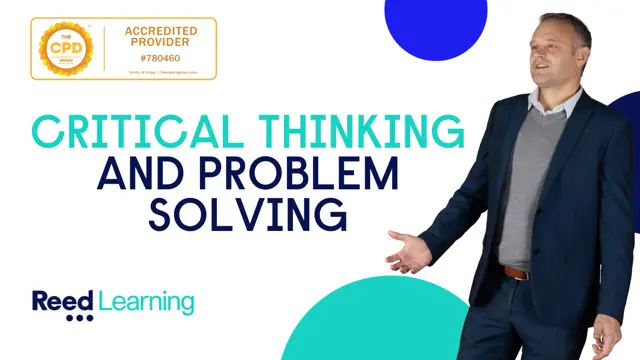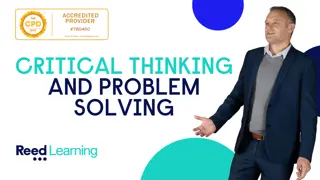
Critical Thinking and Problem Solving Training Course
Reed Learning
Summary
- Tutor is available to students
Add to basket or enquire
Overview
The Critical Thinking and Problem Solving course is designed to enhance participants' analytical and decision-making skills. This program empowers professionals to approach challenges with a strategic and systematic mindset, fostering effective problem-solving in various organizational contexts.
Description
Introduction to Critical Thinking:
- Defining critical thinking and its importance in decision-making.
- Recognizing cognitive biases and overcoming them.
- Developing a questioning and reflective mindset.
Problem Identification and Definition:
- Techniques for identifying and defining complex problems.
- Root cause analysis and problem framing.
- Understanding the interconnected nature of organizational challenges.
Analytical Thinking Skills:
- Developing analytical skills to assess information objectively.
- Utilizing data and evidence in decision-making.
- Enhancing pattern recognition and trend analysis.
Decision-Making Models:
- Exploring various decision-making models.
- Understanding the pros and cons of different approaches.
- Applying the appropriate model based on the context.
Creative Problem Solving:
- Techniques for generating innovative solutions.
- Encouraging a culture of creativity and idea generation.
- Balancing creativity with feasibility in solution development.
Strategic Thinking:
- Aligning problem-solving efforts with organizational goals.
- Developing a strategic mindset for long-term success.
- Understanding the impact of decisions on the broader organizational context.
Collaborative Problem Solving:
- Fostering effective collaboration in problem-solving.
- Building diverse and inclusive problem-solving teams.
- Leveraging collective intelligence for better outcomes.
Decision Implementation and Monitoring:
- Planning and executing decisions effectively.
- Establishing monitoring mechanisms for decision outcomes.
- Adaptive strategies for mid-course corrections.
Continuous Improvement:
- Incorporating feedback loops for continuous learning.
- Iterative problem-solving and improvement cycles.
- Developing a proactive approach to organizational challenges.
Who is this course for?
This course is suitable for professionals at all levels who want to enhance their critical thinking and problem-solving skills. It is beneficial for individuals working in diverse sectors, including business, healthcare, education, and public administration.
Requirements
This course requires a minimum of 4 or more delegates for group participation, encouraging collaborative learning, and allowing participants to apply critical thinking principles in a team setting.
Questions and answers
Reviews
Currently there are no reviews for this course. Be the first to leave a review.
Legal information
This course is advertised on reed.co.uk by the Course Provider, whose terms and conditions apply. Purchases are made directly from the Course Provider, and as such, content and materials are supplied by the Course Provider directly. Reed is acting as agent and not reseller in relation to this course. Reed's only responsibility is to facilitate your payment for the course. It is your responsibility to review and agree to the Course Provider's terms and conditions and satisfy yourself as to the suitability of the course you intend to purchase. Reed will not have any responsibility for the content of the course and/or associated materials.


